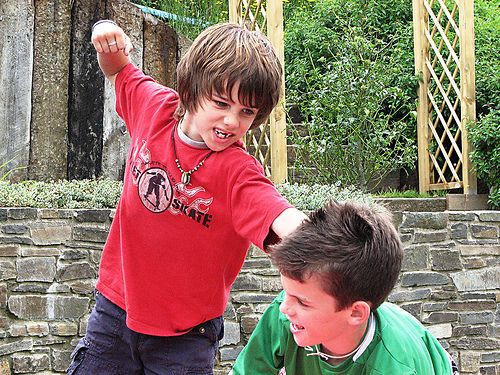Behavior Problems In Preschool? Genes May Be Responsible For Aggressive Acting Out

Preschoolers and kids who attend child care centers may experience behavioral problems not solely through environmental factors, but because of genetic predispositions, a recent study finds.
The reasons behind such instances of acting out have long been debated by researchers who gravitate toward one of two camps: either they point to how children are socialized, either at home or at the centers themselves; or they fall into a camp that upholds deeper, innate tendencies encoded in the child’s DNA. The present study aligns more with the latter assessment, as it suggests child care facilities, such as day care, may simply provide the setting, not the cause, for behavioral issues.
Published in the International Journal of Behavioral Development, the study comes foremost out of Oregon State University and involves data collected from 10 states and 233 families. Adoptive families were compared with biological families in order to isolate particular genetic components.
The team collected genetic data from both parents and children, and found birth parents who tended to score highly on self-reported measures of negative emotion and self-control also tended to have children who mirrored those behaviors. Controlling for the adoptive parents’ behavior, the researchers still found significant similarities that pointed to the difference being genetic.
“Assuming that findings like this are replicated, we can stop worrying so much that all children will develop behavior problems at center-based care facilities, because it has been a concern,” the study’s lead author, Shannon Lipscomb, said in a news release. “But some children (with this genetic predisposition) may be better able to manage their behavior in a different setting, in a home or smaller group size.”
Genetic predispositions don’t doom children to futures riddled with criminal charges and drug use. The occasional spat between 3-year-olds may be in the child’s blood, so to speak, but environmental influence still plays a role. The grace with which it’s handled may simply need more attention.
One of the leading theories in how to shift a child’s behavior pattern is through teaching a sense of empathy. Helping a child understand, for instance, that the pain she feels is the same pain another girl feels, builds a sense of compassion. For youngsters whose behavior seems cold and indifferent, empathy may act as the environmental key to unlock a genetic trait.
“You are your child’s best emotional tutor,” says Laura Padilla Walker, assistant professor in the School of Family Life at Brigham Young University. “You have to help them understand what all these emotions are that they’re feeling.”
The present study implies that children’s actions aren’t always reactions. Sometimes, perhaps often, they do or say hurtful things without fully understanding the consequences. Even in an environment that fosters understanding, children who are genetically predisposed to acting one way over another won’t pick up on social cues. External clues drown among internal compulsions.
For Lipscomb, generating this awareness doesn’t have to be invasive just because the root problem is genetic. A sufficient fix to the problem could very well be a change in scenery.
“We aren’t recommending that children are genetically tested, but parents and caregivers can assess a child’s needs and help them get to a setting that might be more appropriate,” she said. “This study helps us to explain why some children struggle so much with large peer groups and heightened social interactions. It may not be a problem with a teacher or parent, but that they are struggling on a biological level.”



























